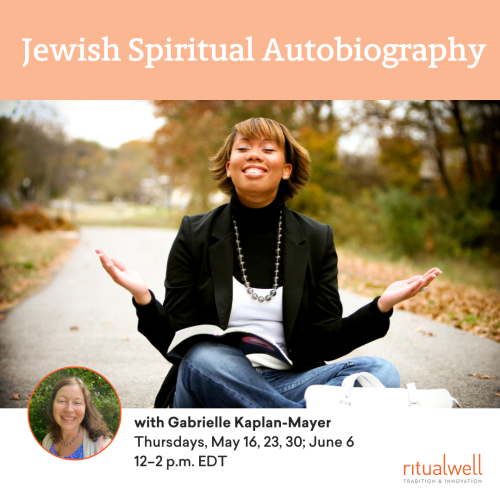I think of the Omer—this period of time we are now in the midst of—as learning to count, learning to wait.
ShavuotShavuot is the holiday fifty days after Passover and commemorates when the Israelite liberation from Egypt culminates with the giving of the Torah. Traditionally, Jews study in an all-night study session, eat dairy products (one interpretation is that the Torah is like milk to us), and read both the Ten Commandments and the Book of Ruth. is the only holiday that the TorahThe Five Books of Moses, and the foundation of all of Jewish life and lore. The Torah is considered the heart and soul of the Jewish people, and study of the Torah is a high mitzvah. The Torah itself a scroll that is hand lettered on parchment, elaborately dressed and decorated, and stored in a decorative ark. It is chanted aloud on Mondays, Thursdays, and Shabbat, according to a yearly cycle. Sometimes "Torah" is used as a colloquial term for Jewish learning and narrative in general. does not affix a particular date to; instead we are commanded to count seven weeks from Passover, and told that when those seven weeks are complete we will arrive at Shavuot. One would think that it would have been easy enough for the Torah to provide us with the date and so we can infer that there must be something to this counting business, something that the tradition wants us to engage in, actively.
Counting is inextricably connected to waiting. When we are counting down to some date, we are usually doing so with dread or excitement—and often a healthy mix of both. Either way there is anticipation, a sense that we are drawing near to something that will test us, change us, or offer something to us—for better or for worse.
My father is Episcopalian and we were raised also celebrating Christmas. So my pre-Omer template for waiting is the advent calendar. We counted down 25 days and each day I would open a little compartment on our calendar that would yield a small piece of chocolate. And of course all the waiting would culminate with a smorgasbord of presents on Christmas morning. (Now I have to count almost twice as long, sans chocolate, and all the waiting culminates with cold cheese blintzes.)
As a child, I listened with rapt attention as John Leader counted down the top 40 songs on the Countdown America radio program. I remember that it was always a bit of a letdown after the #1 song was announced and the show ended.
Can waiting be a spiritual practice? I think of the hasid in the story who is waiting so fervently for moshiach’s arrival that every time he hears a noise from the street (a fishmonger, a car backfiring) he runs outside thinking it is the blast announcing the arrival of the messianic age. Is the hasid’s waiting bringing him out of the moment and distracting him with future fantasy, or is his waiting a holy vigil?
I think of shomrim work, where community members take shifts sitting with the body of someone recently dead, between the time of death and the funeral—a waiting for one’s shift to pass, but also a waiting for something infinitely larger and more mysterious than that. A waiting that makes me think of the verse in Psalms 130:6, “I am more eager for the Lord than watchmen for the morning.” I know of no practice more holy than this kind of waiting.
And I think of the OmerFrom the second day of Passover until Shavuot, Jews count seven weeks – seven times seven days – to commemorate the period between the Exodus from Egypt and the Revelation at Sinai. When the Temple stood, a certain measure (omer) of barley was offered on the altar each day; today, we merely count out the days., this period of time we are now in the midst of: learning to count, learning to wait. On one hand, we know what we are waiting for: the moment of Torah being given. On one hand, we know what’s coming. But, like anything that we await with some mixture of dread and excitement, we don’t know how we will show up for this exchange. We don’t know who we will be in the presence of the awaited moment.
Waiting doesn’t go away; there is always the next thing to wait for. In some very real sense, we are all waiting for our own death, even if we wouldn’t often phrase it that way or don’t think about it in that language. We don’t know who we will be in the presence of that moment either. Perhaps this, then, is the task: to wait with dignity, curiosity, and openness for what is inevitable, but also unknown. To wait in a way that won’t wrench us from the present moment, but bring us more deeply into it. I suppose we learn this through the accumulated experience of being human, but we also need specific practices that teach us how to wait, that teach us how to treasure each day, that teach us not to grasp or attach as we count down to what awaits us.
Rabbi Joshua Boettiger is the spiritual leader of Congregation Beth El in Bennington, VT.






